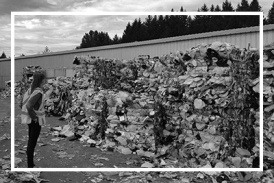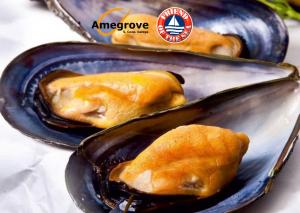Amegrove's Mussels Achieve Friend of the Sea Certification, Setting a New Standard for Sustainable Aquaculture
Mussels are filter feeders, meaning they naturally clean the water around them. This remarkable ability contributes to improved water quality and a healthier marine environment. Unlike other aquaculture forms, mussel farming requires no added feed, as they derive their nutrients from the surrounding water column. This eliminates the environmental concerns associated with feed production and potential pollution.
Furthermore, mussel farms create habitat for other marine species, acting as artificial reefs that enhance biodiversity. They provide shelter and breeding grounds, contributing to a thriving ecosystem. Studies have shown that mussel farms can increase the abundance and diversity of marine life in their vicinity.
But the sustainability story doesn't end there. Mussel farming has a remarkably low carbon footprint compared to other protein sources. Their efficient growth and minimal input requirements make them a climate-friendly choice. As consumers become increasingly aware of the environmental impact of their food choices, mussels are gaining popularity as a sustainable and delicious alternative.
The global mussel market is experiencing significant growth, driven by increasing consumer demand for sustainable seafood. This surge in interest has spurred innovation in mussel farming techniques, with a focus on minimising environmental impact and maximising efficiency. Researchers are exploring new methods for culturing mussels, including integrated multi-trophic aquaculture, where mussels are grown alongside other species, creating a balanced and sustainable ecosystem.
However, not all mussel farming practices are created equal. It's crucial to support producers who prioritise environmental responsibility and social accountability. Third-party certifications, like Friend of the Sea, play a vital role in ensuring that mussels are farmed sustainably.
One company leading the way in responsible mussel aquaculture is
Amegrove.They have achieved Friend of the Sea certification , a testament to their unwavering commitment to sustainable practices.
Amegrove's mussels have earned this prestigious certification due to several key factors. They maintain strict water quality parameters, ensuring a healthy environment for the mussels and surrounding ecosystem. Their farming methods minimise any impact on the seabed and surrounding habitats. Furthermore, they are committed to responsible sourcing of mussel seed, avoiding any overexploitation of natural populations. Finally, Amegrove demonstrates a strong commitment to social responsibility, ensuring fair labour practices and contributing to the local economy. These practices align perfectly with Friend of the Sea’s stringent requirements for sustainable aquaculture, which include evaluating impacts on water quality, habitat preservation, responsible feed sourcing, and social responsibility.
"We are thrilled to award Friend of the Sea certification to Amegrove," said Director of Friend of the Sea, Paolo Bray. "Their dedication to sustainable aquaculture is truly commendable. They serve as an excellent example for the industry, showcasing how high-quality seafood can be produced while respecting the environment and local communities."
Esteban Fernandez Casal, president at Amegrove, added, "This certification is a testament to our team's hard work and dedication to sustainable practices. We believe that responsible aquaculture is essential for our oceans' health and the seafood industry's future. We are proud to partner with Friend of the Sea in promoting environmentally and socially responsible seafood choices."
By choosing Friend of the Sea certified mussels from companies like Amegrove, consumers can support responsible aquaculture practices and contribute to a healthier planet. Mussels offer a delicious and sustainable seafood option, proving that we can enjoy the ocean's bounty while protecting its delicate ecosystems.
More information on Friend of the Sea:
Friend of the Sea is a leading international certification organisation for sustainable seafood. It promotes environmentally responsible aquaculture and fisheries practices and works with producers around the globe to ensure the health of our oceans. For more information, visit Friend of the Sea.
More information on Amegrove:
Amegrove is a company dedicated to producing high-quality mussels through sustainable aquaculture practices. It is committed to minimising its environmental impact and contributing to the local community. Visit its website at Amegrove for more information.
WORLD SUSTAINABILITY ORG
World Sustainability Organization Srl
+39 344 158 0067
email us here
Legal Disclaimer:
EIN Presswire provides this news content "as is" without warranty of any kind. We do not accept any responsibility or liability for the accuracy, content, images, videos, licenses, completeness, legality, or reliability of the information contained in this article. If you have any complaints or copyright issues related to this article, kindly contact the author above.
Kodansha Returns to Anime Expo 2025 with the New Anime 'Gachiakuta' and Legendary 'GHOST IN THE SHELL'
COMMUNITY SECURITY SERVICE BOLSTERS DEFENSES IN RESPONSE TO ELEVATED THREAT WARNING FROM DHS/FBI
From Messy Moments to Meaningful Memories: 'Once Upon an Amateur Mom' is a Tribute to Mothers Everywhere
Kalendarium
Więcej ważnych informacji
 Jedynka Newserii
Jedynka Newserii

 Jedynka Newserii
Jedynka Newserii

Handel

Ze względu na różnice w cenach surowce wtórne przegrywają z pierwotnymi. To powoduje problemy branży recyklingowej
Rozporządzenie PPWR stawia ambitne cele w zakresie wykorzystania recyklatów w poszczególnych rodzajach opakowań. To będzie oznaczało wzrost popytu na materiały wtórne pochodzące z recyklingu. Obecnie problemy branży recyklingu mogą spowodować, że popyt będzie zaspokajany głównie przez import. Dziś do dobrowolnego wykorzystania recyklatów nie zachęcają przede wszystkim ceny – surowiec pierwotny można kupić taniej niż ten z recyklingu.
Przemysł spożywczy
Rośnie presja konkurencyjna na unijne rolnictwo. Bez rekompensat sytuacja rolników może się pogarszać

Rolnictwo i żywność, w tym rybołówstwo, są sektorami strategicznymi dla UE. System rolno-spożywczy, oparty na jednolitym rynku europejskim, wytwarza ponad 900 mld euro wartości dodanej. Jego konkurencyjność stoi jednak przed wieloma wyzwaniami – to przede wszystkim eksport z Ukrainy i niedługo także z krajów Mercosur, a także presja związana z oczekiwaniami konsumentów i Zielonym Ładem. Bez rekompensat rolnikom może być trudno tym wyzwaniom sprostać.
Transport
Infrastruktury ładowania elektryków przybywa w szybkim tempie. Inwestorzy jednak napotykają szereg barier

Liczba punktów ładowania samochodów elektrycznych wynosi dziś ok. 10 tys., a tempo wzrostu wynosi ok. 50 proc. r/r. Dynamika ta przez wiele miesięcy była wyższa niż wyniki samego rynku samochodów elektrycznych, na które w poprzednim roku wpływało zawieszenie rządowych dopłat do zakupu elektryka. Pierwszy kwartał br. zamknął się 22-proc. wzrostem liczby rejestracji w ujęciu rocznym, ale kwiecień przyniósł już wyraźne odbicie – o 100 proc.
Partner serwisu
Szkolenia

Akademia Newserii
Akademia Newserii to projekt, w ramach którego najlepsi polscy dziennikarze biznesowi, giełdowi oraz lifestylowi, a także szkoleniowcy z wieloletnim doświadczeniem dzielą się swoją wiedzą nt. pracy z mediami.









.gif)

 |
| |
| |
|